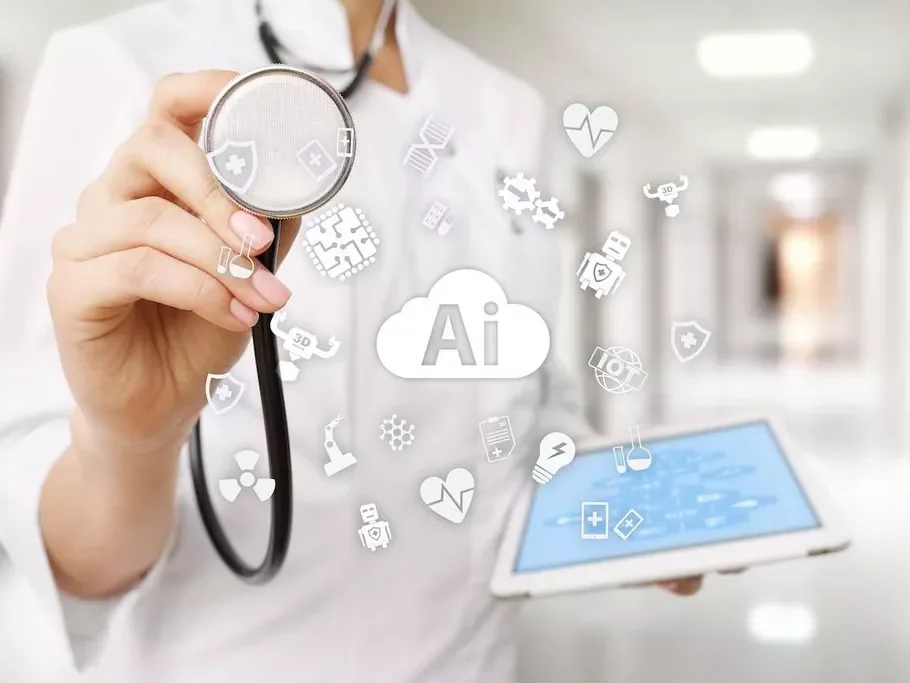Artificial intelligence in healthcare is one of global medicine’s most fundamental contemporary developments. The first appearance of brand-new drugs, radical redesigning of the procedure of diagnosis, and other advancements in medical service are all now possible through the use of AI for healthcare, which is also lowering the expenses of operating facilities.
What is AI in healthcare, and how to use it?
AI technology is a breakthrough development that boosts the state of medicine. What AI means for healthcare? AI can profoundly affect the whole field of medicine: reorganize the diagnostic system, facilitate the creation of new medications, enhance the quality of services in general and cut expenses. The capabilities are practically infinite in the future.
There are several ways in how is AI used in healthcare. You can find the following distribution among the standard classification:
- At the organizational level – arranging preventive actions, identifying patient groups at high risk of sickness, and anticipating diseases are all essential tasks.
- Hospital operations are automated and optimized at the health screening level, and diagnostic accuracy is improved.
- At the administrative level – pricing administration and patient risk reduction.
At the level of service provision, each patient’s therapy and drug regimen is tailored, and conversational AI for healthcare industry in the form of a virtual assistant is applied to create a patient flow in a hospital.
Types of AI in medicine
Medicine is one of the perfect-pitch places to introduce new developments. AI for healthcare manifests itself in different guises that can be utilized at different levels.
Machine learning
In the field of health care, ML has established itself as one of the most influential AI methods. It is a critical topic that forms the foundation to several AI for healthcare solutions. With their help, medical companies were able to classify diseases much better and more accurately and figure out the most useful types of therapy. All this became possible with the help of a unique AI composition and design.
NLP
AI researchers have been working to decode the secrets of human language. The procedures of speech recognition, text analysis, and translation are frequently used in NLP projects. The sector is changing due to AI for healthcare, which is also enhancing patient outcomes. Its regular use in NLP to analyze and interpret unstructured clinical texts is one such instance.
Rule-based expert systems
AI is now a crucial component of the medical system, enabling quick and precise clinical judgment. Several EHR systems are available, including pre-established regulations and software to aid in streamlining procedures. When engineers and experts work together to develop a set of rules in a particular sector, expert systems are produced.
Physical robots
Numerous industrial robots are deployed each year globally, with them being widely used in countless industries. They are skilled at doing predetermined jobs, including moving goods, welding, putting things together, and lifting items in factories and warehouses. Hospitals are already using physical robots to transport medical goods.
Robotic process automation
AI-grounded robotic process mechanization enables info systems to automate various processes. Compared to other AI for healthcare technologies, it offers a precise, affordable, and accessible solution to complete such jobs. These systems can conduct semi-intelligent activities by combining information clouds, business rules, and a specific type of presentation layer.
Why is AI so vital in the health services field?
There are numerous benefits to using top-notch systems in medicine. The principal advantage of these state-of-art technologies is that disease diagnosis can now be made more precisely. Doctors’ capability to pinpoint a particular issue in a person’s body nowadays might be challenging. On the other hand, a neural network might sort a case rapidly since it has access to a great array of information and sickness records.
It should be kept in mind, meanwhile, that AI is yet unable to resolve challenging medical issues. This technology won’t produce the most cutting-edge progress of the future alone. It is still inconceivable to think that a device could scan the human body in a couple of seconds, identify any issues, and suggest the best therapy. The existing potential is, nonetheless, highly fascinating for medical professionals.

Diagnosing and treating applications
AI in healthcare is reshaping the sector and enhancing patient outcomes by analyzing enormous data and spotting illness indications. It can assist doctors and researchers in making sense of complex info, which may result in even curing previously incurable diseases. Physicians can easily spot patterns and trends in patient info with the aid of AI, taking to earlier diagnosis and better individualized treatment approaches.
Pros of administrative applications
The industry has successfully used AI platform for healthcare and multiple administrative applications. AI has a significant potential to enhance the management of healthcare. Its services range from claims processing and clinical documentation to data and revenue cycle management. Hospitals can increase productivity and give their patients better care by implementing healthcare chatbots. The usage of ML has also been used in administering medicine claims and payments.
Top use cases
The best use of AI in healthcare is widespread at many levels. To a certain extent, AI has taken root in multiple fields of medicine. What is AI used for in healthcare? Top-notch examples are as follows:
- Applying machine learning and AI for healthcare in radiology enhances the quality control of imaging procedures.
- It may be used to identify and diagnose cancer by analyzing medical pictures from CT scans, MRIs, and PET scans.
- It can evaluate vast volumes of patient records to find patterns, correlations, and links between different factors, including demographic data, medical history, and treatment history.
One of the most prominent examples of AI in healthcare – in websites, AI may serve as a virtual assistant. You may install a conversational interface on your medical facility with the aid of efficient MetaDialog AI solutions for healthcare. You will have more success attracting new clients and enhancing their experience with the assistance of expert solutions.
Challenges with implementing AI
AI is not an entirely perfect product with no implementation issues. While attempting to employ AI in the medical industry today, you may encounter several issues:
- The “black box” theory under which aAI systems operate prevents the user from knowing why the software chose one course of action over another. It is difficult to pinpoint why AI machine learning for healthcare addresses the problem poorly.
- AI system development and installation demand significant costs.
- It requires considerable computer capacity to function well and swiftly, which may not be present in a typical medical institution.
Despite the significant challenges of putting these systems into practice, the possibilities of their usage motivate people to explore ways to overcome any barriers.
AI’s potential in medicine
AI will transform healthcare in the upcoming years, multiplying artificial intelligence healthcare examples. The capacity of AI to gather up data, analyze it and give end users clear outputs sets it apart from conventional medical solutions.
AI applications’ primary goal is to examine the relationship between clinical methods and patient health outcomes. Establishing treatment protocols, medication research, customized medicine, patient monitoring, and care will all increasingly rely on its techniques.
